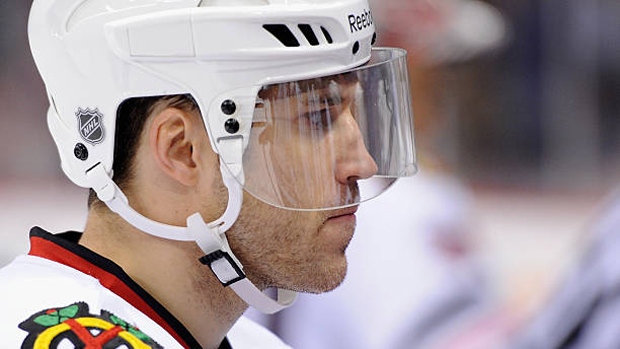Mar 2, 2020
NHL players encouraged to play through concussion symptoms, Montador lawyer says
The National Hockey League is deceiving retired, current and future players by continuing to downplay the long-term health risks of repeated brain trauma, lawyers for the estate of former NHL player Steve Montador allege in new court filings.

The National Hockey League is deceiving retired, current and future players by continuing to downplay the long-term health risks of repeated brain trauma, lawyers for the estate of former NHL player Steve Montador allege in new court filings.
“The NHL is not honest or upfront with its players,” William Gibbs, a lawyer for Montador’s estate, wrote in documents filed Feb. 28 in U.S. district court in Chicago.
The documents were filed in connection with a request made by the NHL in January for summary judgement in a wrongful death lawsuit filed by Montador's family. If the NHL's request is granted, a judge would make a ruling and the case would conclude without depositions or a trial. Montador's lawyers are fighting the NHL’s motion.
Gibbs wrote that multiple scientific studies over the past decades have established a link between repeated brain trauma and neurocognitive diseases and disorders, such as chronic traumatic encephalopathy, or CTE.
“The NHL denies this reality,” he wrote. “Every time that a former NHL player’s brain reveals CTE, the league posits that ‘it’s way premature to be drawing any conclusions at this point; regarding NHL play and CTE.’ Even to this day, after repeatedly informing its players and the public that it is the ‘leader’ in concussion care, knowledge and research, the NHL boldly informs all NHL players, past, present and future, that there is no proven scientific or statistical evidence demonstrating a connection or correlation between repeated impacts to the head sustained in the NHL and long-term neurodegenerative diseases.
“These false proclamations harm NHL players. By inserting doubt into the equation, the NHL implicitly encourages players to disregard the significance of head injuries and play through the symptoms.”
Montador played 571 NHL games during a 14-year pro career that included stints with the Flames, Panthers, Ducks, Bruins, Sabres and Blackhawks. He was 35 when he died on Feb. 15, 2015. Three months after his death, researchers with the Canadian Sports Concussion Project at Toronto’s Krembil Neuroscience Centre disclosed the former defenceman had suffered from CTE.
Montador had 19 documented concussions during his pro and junior hockey career and was repeatedly cleared to return to the NHL by team doctors after four concussions in 12 weeks in 2012, his family says.
Montador’s family sued the NHL in December 2015, alleging the league has promoted violence and profited off of it while not adequately advising players of the risks of repeated long-term brain injuries.
The Montador family’s lawsuit against the NHL was put on hold for four years while the NHL fought a proposed class-action lawsuit filed by more than 100 former NHL players. After a settlement in that case – one that bars nearly 300 former players and their families from pursuing legal action in the future in exchange for a $22,000 (U.S.) per player settlement – Montador’s case moved forward.
The NHL has alleged that any legal claims related to Montador’s injury “may be barred, in whole or in part, from recovery due to his contributory and/or comparative negligence."
"Any injury or damage sustained by [Montador] was caused, in whole or in part, by [Montador's] own lack of due care and fault, and/or by pre-existing conditions; and/or the lack of due care of others for whom the NHL has no responsibility or control,” the league wrote in a July 2019 answer to the Montador family’s lawsuit.
In his Feb. 28 filing, Gibbs referenced an email sent by NHL deputy commissioner Bill Daly on September 11, 2011, to NHL commissioner Gary Bettman and other colleagues after three NHL enforcers — Derek Boogaard, Rick Rypien, and Wade Belak — died in a span of four months. Daly wrote that hockey fighting leads to head injuries and concussions, more cases of depressions, and more instances of “personal tragedies.”
“While the NHL has long known that its players involved in fights were susceptible to brain damage and/or depression and/or substance abuse, due to the extreme physical and emotional toll fighting placed upon them, [it] failed to put an end to the problem,” Montador’s lawyers wrote. “While unnecessary violence, including brutal fist-fighting, has permeated NHL games, the NHL has been on notice that multiple blows to the head can lead to long-term brain injury, including but not limited to memory loss, dementia, depression, addiction and CTE and its related symptoms… the NHL said nothing to its players about any of it.”
The NHL has until March 13 to reply to the plaintiff’s filing.

